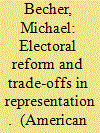| Srl | Item |
| 1 |
ID:
168519


|
|
|
|
|
| Summary/Abstract |
We examine the effect of electoral institutions on two important features of representation that are often studied separately: policy responsiveness and the quality of legislators. Theoretically, we show that while a proportional electoral system is better than a majoritarian one at representing popular preferences in some contexts, this advantage can come at the price of undermining the selection of good politicians. To empirically assess the relevance of this trade-off, we analyze an unusually controlled electoral reform in Switzerland early in the twentieth century. To account for endogeneity, we exploit variation in the intensive margin of the reform, which introduced proportional representation, based on administrative constraints and data on voter preferences. A difference-in-difference analysis finds that higher reform intensity increases the policy congruence between legislators and the electorate and reduces legislative effort. Contemporary evidence from the European Parliament supports this conclusion.
|
|
|
|
|
|
|
|
|
|
|
|
|
|
|
|
| 2 |
ID:
178290


|
|
|
|
|
| Summary/Abstract |
It has long been recognized that economic inequality may undermine the principle of equal responsiveness that lies at the core of democratic governance. A recent wave of scholarship has highlighted an acute degree of political inequality in contemporary democracies in North America and Europe. In contrast to the view that unequal responsiveness in favor of the affluent is nearly inevitable when income inequality is high, we argue that organized labor can be an effective source of political equality. Focusing on the paradigmatic case of the U.S. House of Representatives, our novel dataset combines income-specific estimates of constituency preferences based on 223,000 survey respondents matched to roll-call votes with a measure of district-level union strength drawn from administrative records. We find that local unions significantly dampen unequal responsiveness to high incomes: a standard deviation increase in union membership increases legislative responsiveness towards the poor by about six to eight percentage points. As a result, in districts with relatively strong unions legislators are about equally responsive to rich and poor Americans. We rule out alternative explanations using flexible controls for policies, institutions, and economic structure, as well as a novel instrumental variable for unionization based on history and geography. We also show that the impact of unions operates via campaign contributions and partisan selection.
|
|
|
|
|
|
|
|
|
|
|
|
|
|
|
|